The Impact of Globalization on Business
VerifiedAdded on 2023/06/12
|16
|3589
|451
AI Summary
This article discusses the positive and negative impacts of globalization on businesses, with a focus on Siemens Company. It covers topics such as job opportunities, competition, technology, and cultural integration.
Contribute Materials
Your contribution can guide someone’s learning journey. Share your
documents today.

Business 1
THE IMPACT OF GLOBALIZATON ON BUSINESS
Name
Institution
Course
Tutor
City/State
Date
THE IMPACT OF GLOBALIZATON ON BUSINESS
Name
Institution
Course
Tutor
City/State
Date
Secure Best Marks with AI Grader
Need help grading? Try our AI Grader for instant feedback on your assignments.
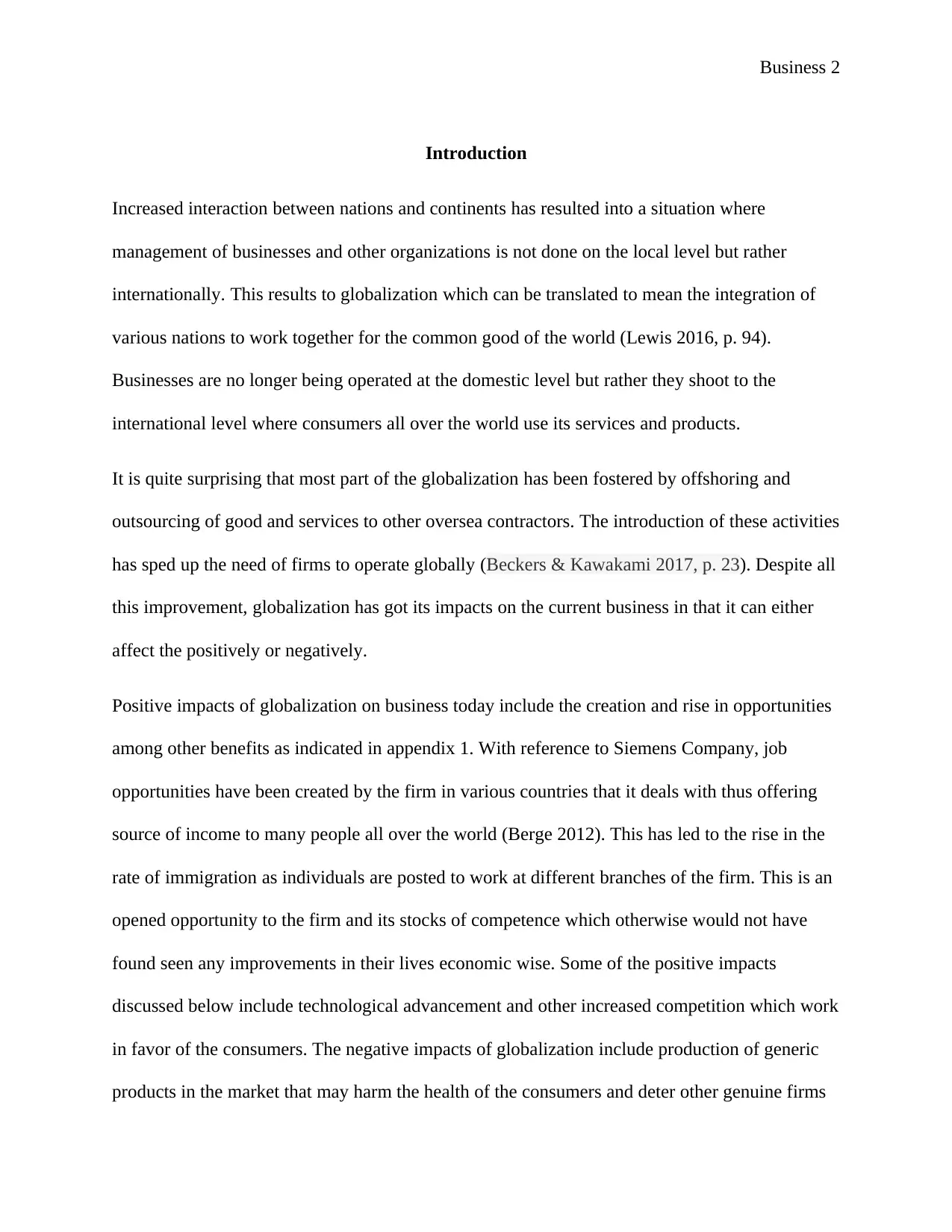
Business 2
Introduction
Increased interaction between nations and continents has resulted into a situation where
management of businesses and other organizations is not done on the local level but rather
internationally. This results to globalization which can be translated to mean the integration of
various nations to work together for the common good of the world (Lewis 2016, p. 94).
Businesses are no longer being operated at the domestic level but rather they shoot to the
international level where consumers all over the world use its services and products.
It is quite surprising that most part of the globalization has been fostered by offshoring and
outsourcing of good and services to other oversea contractors. The introduction of these activities
has sped up the need of firms to operate globally (Beckers & Kawakami 2017, p. 23). Despite all
this improvement, globalization has got its impacts on the current business in that it can either
affect the positively or negatively.
Positive impacts of globalization on business today include the creation and rise in opportunities
among other benefits as indicated in appendix 1. With reference to Siemens Company, job
opportunities have been created by the firm in various countries that it deals with thus offering
source of income to many people all over the world (Berge 2012). This has led to the rise in the
rate of immigration as individuals are posted to work at different branches of the firm. This is an
opened opportunity to the firm and its stocks of competence which otherwise would not have
found seen any improvements in their lives economic wise. Some of the positive impacts
discussed below include technological advancement and other increased competition which work
in favor of the consumers. The negative impacts of globalization include production of generic
products in the market that may harm the health of the consumers and deter other genuine firms
Introduction
Increased interaction between nations and continents has resulted into a situation where
management of businesses and other organizations is not done on the local level but rather
internationally. This results to globalization which can be translated to mean the integration of
various nations to work together for the common good of the world (Lewis 2016, p. 94).
Businesses are no longer being operated at the domestic level but rather they shoot to the
international level where consumers all over the world use its services and products.
It is quite surprising that most part of the globalization has been fostered by offshoring and
outsourcing of good and services to other oversea contractors. The introduction of these activities
has sped up the need of firms to operate globally (Beckers & Kawakami 2017, p. 23). Despite all
this improvement, globalization has got its impacts on the current business in that it can either
affect the positively or negatively.
Positive impacts of globalization on business today include the creation and rise in opportunities
among other benefits as indicated in appendix 1. With reference to Siemens Company, job
opportunities have been created by the firm in various countries that it deals with thus offering
source of income to many people all over the world (Berge 2012). This has led to the rise in the
rate of immigration as individuals are posted to work at different branches of the firm. This is an
opened opportunity to the firm and its stocks of competence which otherwise would not have
found seen any improvements in their lives economic wise. Some of the positive impacts
discussed below include technological advancement and other increased competition which work
in favor of the consumers. The negative impacts of globalization include production of generic
products in the market that may harm the health of the consumers and deter other genuine firms
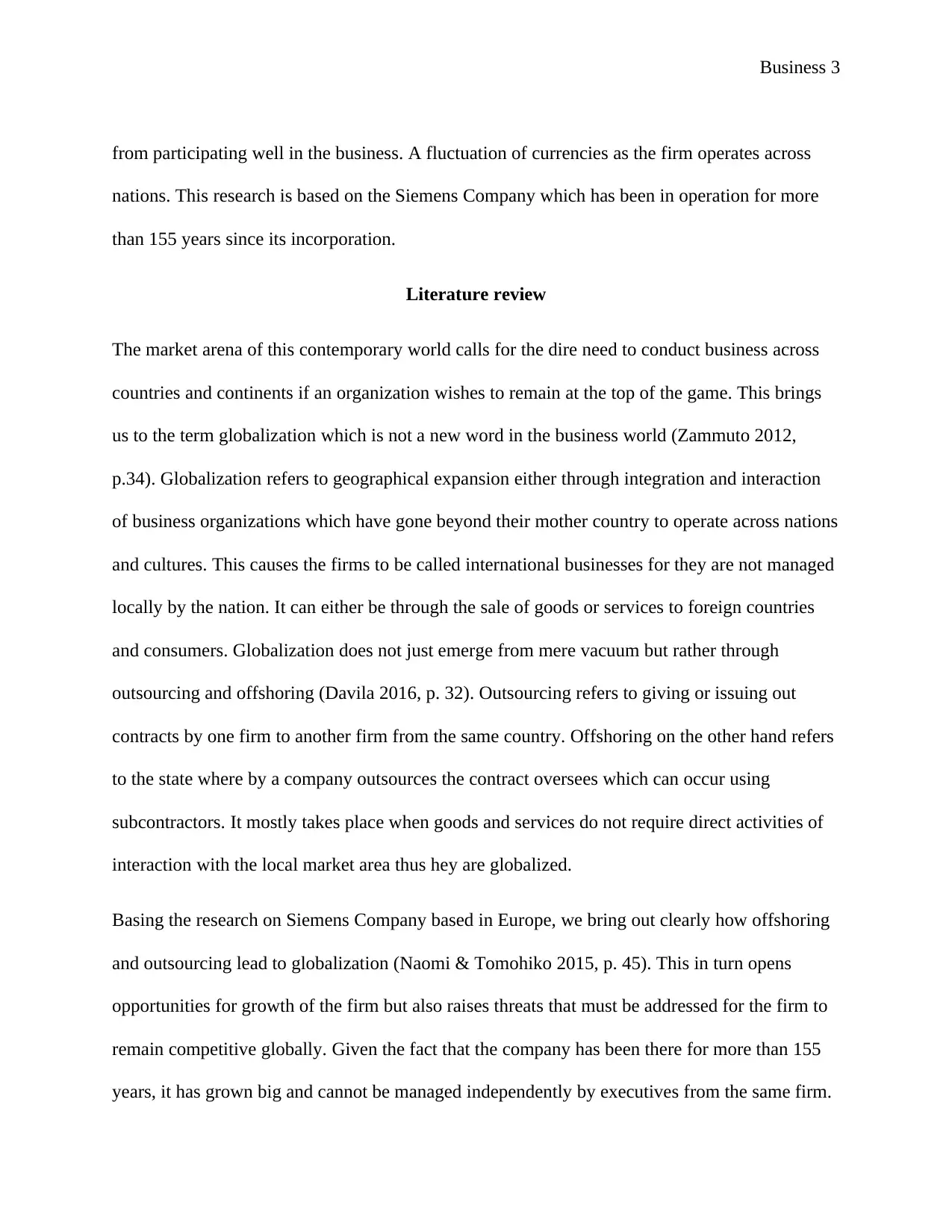
Business 3
from participating well in the business. A fluctuation of currencies as the firm operates across
nations. This research is based on the Siemens Company which has been in operation for more
than 155 years since its incorporation.
Literature review
The market arena of this contemporary world calls for the dire need to conduct business across
countries and continents if an organization wishes to remain at the top of the game. This brings
us to the term globalization which is not a new word in the business world (Zammuto 2012,
p.34). Globalization refers to geographical expansion either through integration and interaction
of business organizations which have gone beyond their mother country to operate across nations
and cultures. This causes the firms to be called international businesses for they are not managed
locally by the nation. It can either be through the sale of goods or services to foreign countries
and consumers. Globalization does not just emerge from mere vacuum but rather through
outsourcing and offshoring (Davila 2016, p. 32). Outsourcing refers to giving or issuing out
contracts by one firm to another firm from the same country. Offshoring on the other hand refers
to the state where by a company outsources the contract oversees which can occur using
subcontractors. It mostly takes place when goods and services do not require direct activities of
interaction with the local market area thus hey are globalized.
Basing the research on Siemens Company based in Europe, we bring out clearly how offshoring
and outsourcing lead to globalization (Naomi & Tomohiko 2015, p. 45). This in turn opens
opportunities for growth of the firm but also raises threats that must be addressed for the firm to
remain competitive globally. Given the fact that the company has been there for more than 155
years, it has grown big and cannot be managed independently by executives from the same firm.
from participating well in the business. A fluctuation of currencies as the firm operates across
nations. This research is based on the Siemens Company which has been in operation for more
than 155 years since its incorporation.
Literature review
The market arena of this contemporary world calls for the dire need to conduct business across
countries and continents if an organization wishes to remain at the top of the game. This brings
us to the term globalization which is not a new word in the business world (Zammuto 2012,
p.34). Globalization refers to geographical expansion either through integration and interaction
of business organizations which have gone beyond their mother country to operate across nations
and cultures. This causes the firms to be called international businesses for they are not managed
locally by the nation. It can either be through the sale of goods or services to foreign countries
and consumers. Globalization does not just emerge from mere vacuum but rather through
outsourcing and offshoring (Davila 2016, p. 32). Outsourcing refers to giving or issuing out
contracts by one firm to another firm from the same country. Offshoring on the other hand refers
to the state where by a company outsources the contract oversees which can occur using
subcontractors. It mostly takes place when goods and services do not require direct activities of
interaction with the local market area thus hey are globalized.
Basing the research on Siemens Company based in Europe, we bring out clearly how offshoring
and outsourcing lead to globalization (Naomi & Tomohiko 2015, p. 45). This in turn opens
opportunities for growth of the firm but also raises threats that must be addressed for the firm to
remain competitive globally. Given the fact that the company has been there for more than 155
years, it has grown big and cannot be managed independently by executives from the same firm.
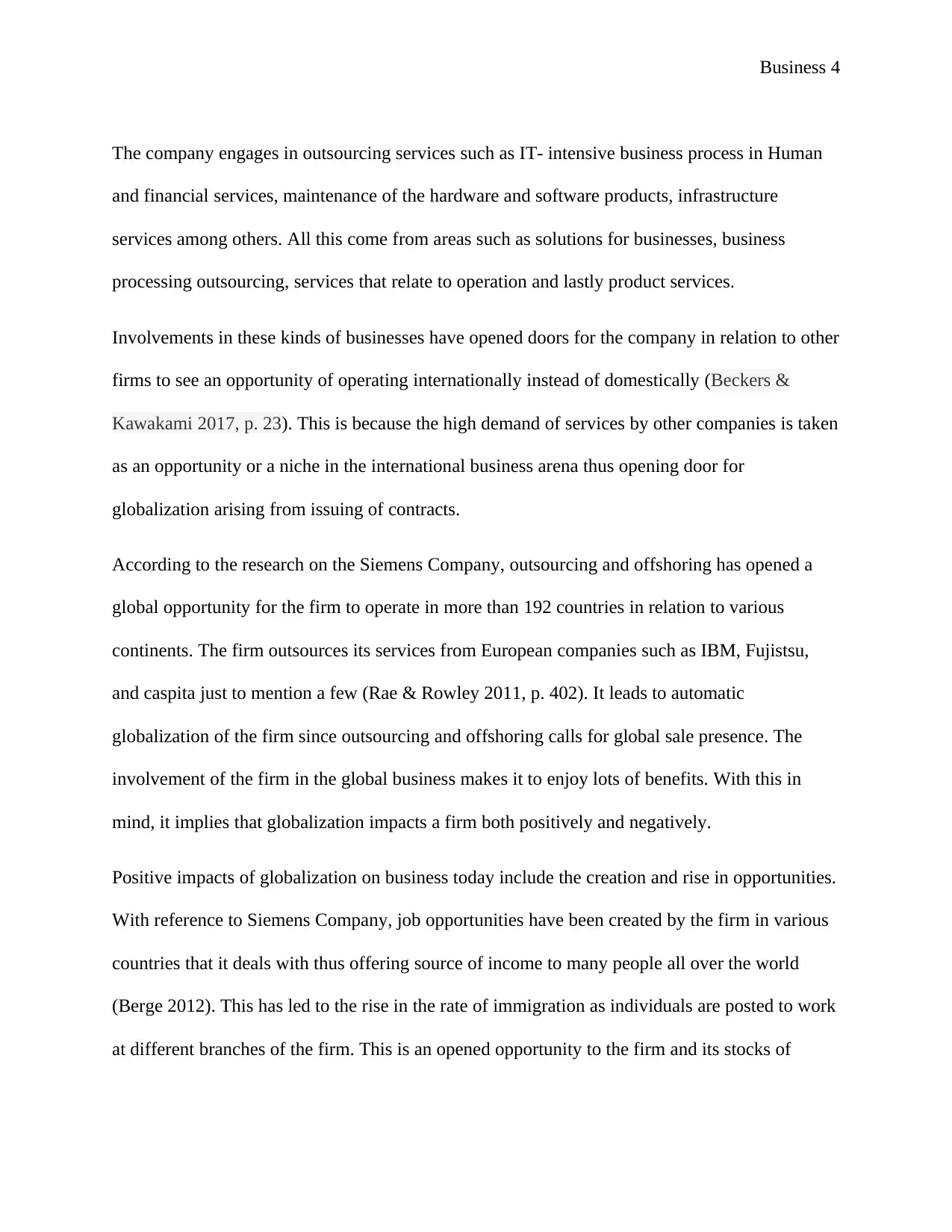
Business 4
The company engages in outsourcing services such as IT- intensive business process in Human
and financial services, maintenance of the hardware and software products, infrastructure
services among others. All this come from areas such as solutions for businesses, business
processing outsourcing, services that relate to operation and lastly product services.
Involvements in these kinds of businesses have opened doors for the company in relation to other
firms to see an opportunity of operating internationally instead of domestically (Beckers &
Kawakami 2017, p. 23). This is because the high demand of services by other companies is taken
as an opportunity or a niche in the international business arena thus opening door for
globalization arising from issuing of contracts.
According to the research on the Siemens Company, outsourcing and offshoring has opened a
global opportunity for the firm to operate in more than 192 countries in relation to various
continents. The firm outsources its services from European companies such as IBM, Fujistsu,
and caspita just to mention a few (Rae & Rowley 2011, p. 402). It leads to automatic
globalization of the firm since outsourcing and offshoring calls for global sale presence. The
involvement of the firm in the global business makes it to enjoy lots of benefits. With this in
mind, it implies that globalization impacts a firm both positively and negatively.
Positive impacts of globalization on business today include the creation and rise in opportunities.
With reference to Siemens Company, job opportunities have been created by the firm in various
countries that it deals with thus offering source of income to many people all over the world
(Berge 2012). This has led to the rise in the rate of immigration as individuals are posted to work
at different branches of the firm. This is an opened opportunity to the firm and its stocks of
The company engages in outsourcing services such as IT- intensive business process in Human
and financial services, maintenance of the hardware and software products, infrastructure
services among others. All this come from areas such as solutions for businesses, business
processing outsourcing, services that relate to operation and lastly product services.
Involvements in these kinds of businesses have opened doors for the company in relation to other
firms to see an opportunity of operating internationally instead of domestically (Beckers &
Kawakami 2017, p. 23). This is because the high demand of services by other companies is taken
as an opportunity or a niche in the international business arena thus opening door for
globalization arising from issuing of contracts.
According to the research on the Siemens Company, outsourcing and offshoring has opened a
global opportunity for the firm to operate in more than 192 countries in relation to various
continents. The firm outsources its services from European companies such as IBM, Fujistsu,
and caspita just to mention a few (Rae & Rowley 2011, p. 402). It leads to automatic
globalization of the firm since outsourcing and offshoring calls for global sale presence. The
involvement of the firm in the global business makes it to enjoy lots of benefits. With this in
mind, it implies that globalization impacts a firm both positively and negatively.
Positive impacts of globalization on business today include the creation and rise in opportunities.
With reference to Siemens Company, job opportunities have been created by the firm in various
countries that it deals with thus offering source of income to many people all over the world
(Berge 2012). This has led to the rise in the rate of immigration as individuals are posted to work
at different branches of the firm. This is an opened opportunity to the firm and its stocks of
Secure Best Marks with AI Grader
Need help grading? Try our AI Grader for instant feedback on your assignments.
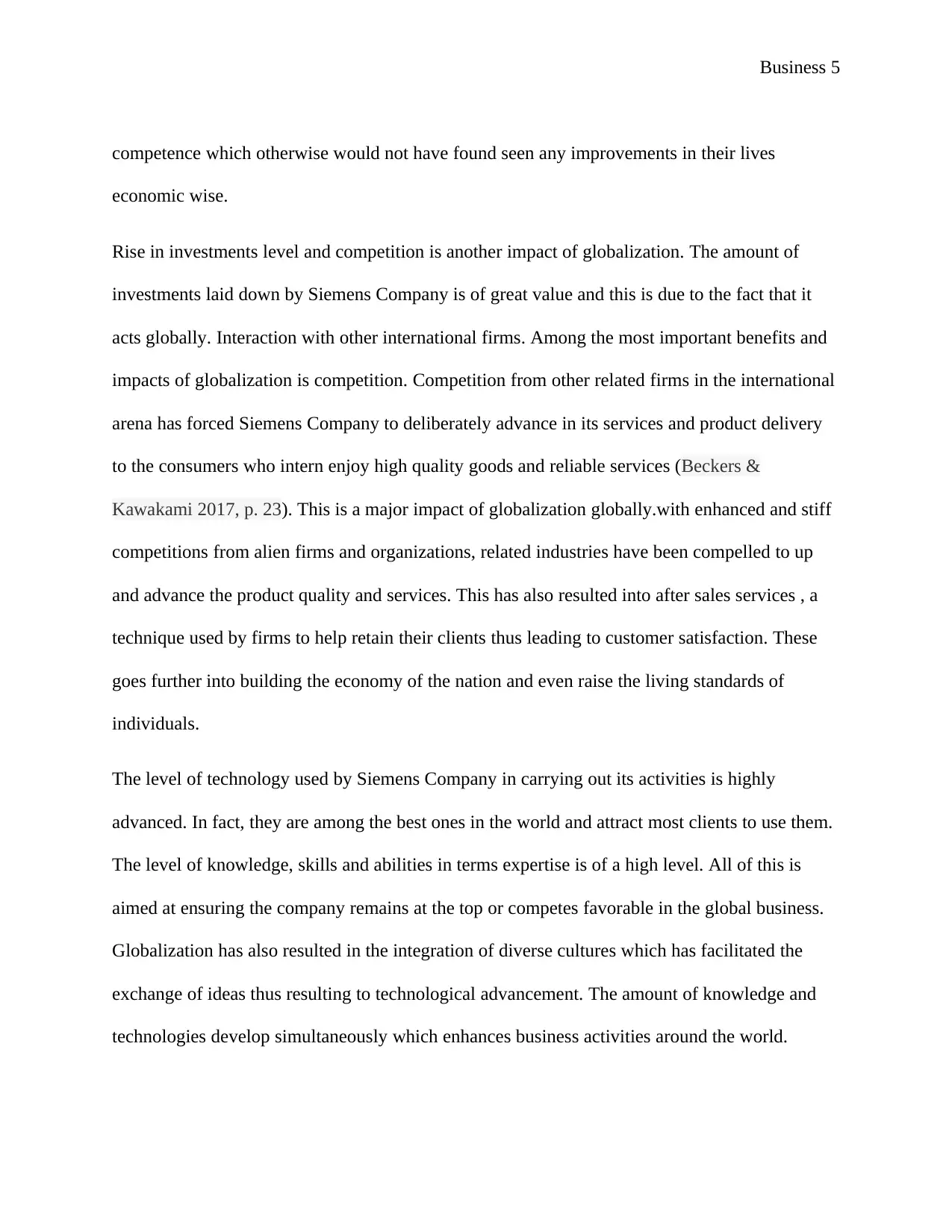
Business 5
competence which otherwise would not have found seen any improvements in their lives
economic wise.
Rise in investments level and competition is another impact of globalization. The amount of
investments laid down by Siemens Company is of great value and this is due to the fact that it
acts globally. Interaction with other international firms. Among the most important benefits and
impacts of globalization is competition. Competition from other related firms in the international
arena has forced Siemens Company to deliberately advance in its services and product delivery
to the consumers who intern enjoy high quality goods and reliable services (Beckers &
Kawakami 2017, p. 23). This is a major impact of globalization globally.with enhanced and stiff
competitions from alien firms and organizations, related industries have been compelled to up
and advance the product quality and services. This has also resulted into after sales services , a
technique used by firms to help retain their clients thus leading to customer satisfaction. These
goes further into building the economy of the nation and even raise the living standards of
individuals.
The level of technology used by Siemens Company in carrying out its activities is highly
advanced. In fact, they are among the best ones in the world and attract most clients to use them.
The level of knowledge, skills and abilities in terms expertise is of a high level. All of this is
aimed at ensuring the company remains at the top or competes favorable in the global business.
Globalization has also resulted in the integration of diverse cultures which has facilitated the
exchange of ideas thus resulting to technological advancement. The amount of knowledge and
technologies develop simultaneously which enhances business activities around the world.
competence which otherwise would not have found seen any improvements in their lives
economic wise.
Rise in investments level and competition is another impact of globalization. The amount of
investments laid down by Siemens Company is of great value and this is due to the fact that it
acts globally. Interaction with other international firms. Among the most important benefits and
impacts of globalization is competition. Competition from other related firms in the international
arena has forced Siemens Company to deliberately advance in its services and product delivery
to the consumers who intern enjoy high quality goods and reliable services (Beckers &
Kawakami 2017, p. 23). This is a major impact of globalization globally.with enhanced and stiff
competitions from alien firms and organizations, related industries have been compelled to up
and advance the product quality and services. This has also resulted into after sales services , a
technique used by firms to help retain their clients thus leading to customer satisfaction. These
goes further into building the economy of the nation and even raise the living standards of
individuals.
The level of technology used by Siemens Company in carrying out its activities is highly
advanced. In fact, they are among the best ones in the world and attract most clients to use them.
The level of knowledge, skills and abilities in terms expertise is of a high level. All of this is
aimed at ensuring the company remains at the top or competes favorable in the global business.
Globalization has also resulted in the integration of diverse cultures which has facilitated the
exchange of ideas thus resulting to technological advancement. The amount of knowledge and
technologies develop simultaneously which enhances business activities around the world.
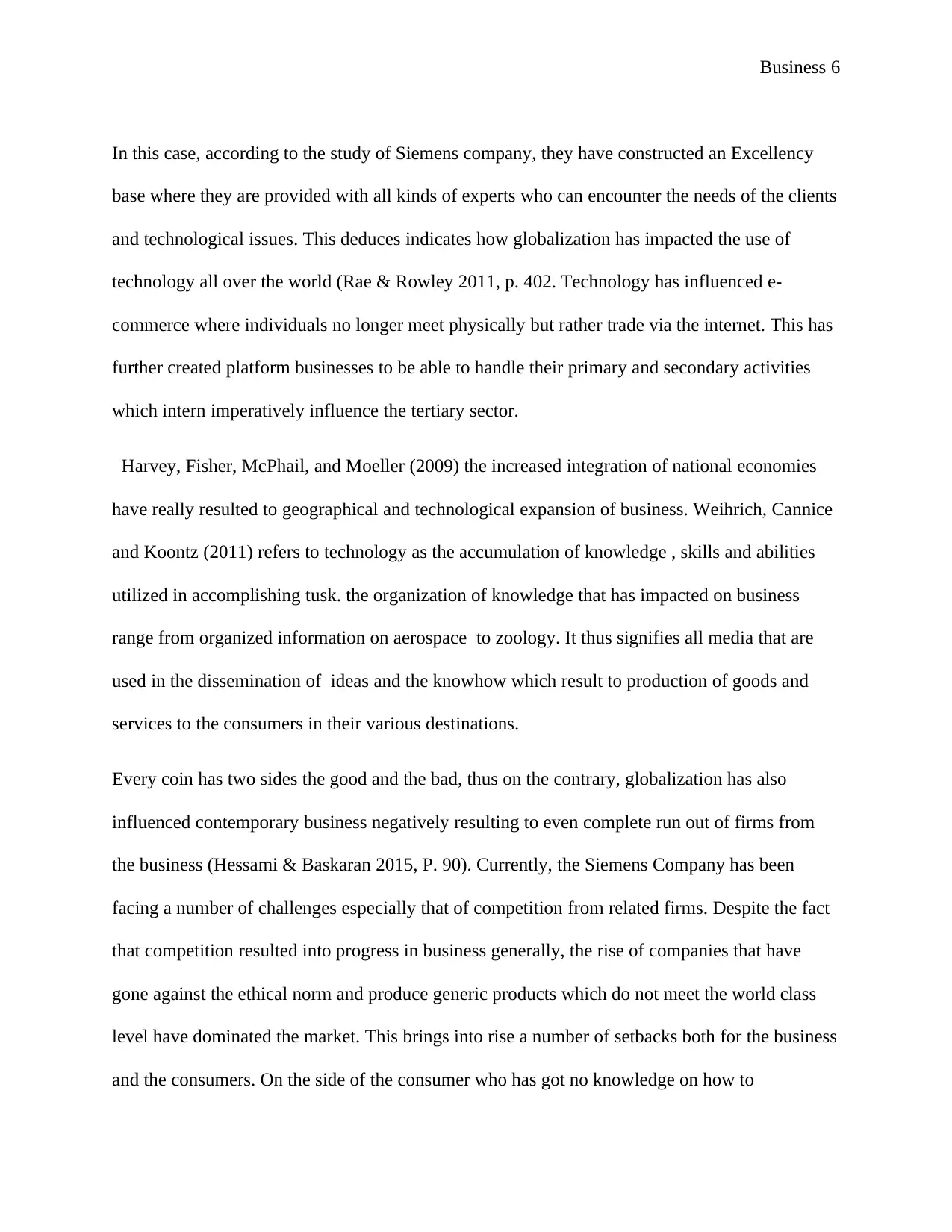
Business 6
In this case, according to the study of Siemens company, they have constructed an Excellency
base where they are provided with all kinds of experts who can encounter the needs of the clients
and technological issues. This deduces indicates how globalization has impacted the use of
technology all over the world (Rae & Rowley 2011, p. 402. Technology has influenced e-
commerce where individuals no longer meet physically but rather trade via the internet. This has
further created platform businesses to be able to handle their primary and secondary activities
which intern imperatively influence the tertiary sector.
Harvey, Fisher, McPhail, and Moeller (2009) the increased integration of national economies
have really resulted to geographical and technological expansion of business. Weihrich, Cannice
and Koontz (2011) refers to technology as the accumulation of knowledge , skills and abilities
utilized in accomplishing tusk. the organization of knowledge that has impacted on business
range from organized information on aerospace to zoology. It thus signifies all media that are
used in the dissemination of ideas and the knowhow which result to production of goods and
services to the consumers in their various destinations.
Every coin has two sides the good and the bad, thus on the contrary, globalization has also
influenced contemporary business negatively resulting to even complete run out of firms from
the business (Hessami & Baskaran 2015, P. 90). Currently, the Siemens Company has been
facing a number of challenges especially that of competition from related firms. Despite the fact
that competition resulted into progress in business generally, the rise of companies that have
gone against the ethical norm and produce generic products which do not meet the world class
level have dominated the market. This brings into rise a number of setbacks both for the business
and the consumers. On the side of the consumer who has got no knowledge on how to
In this case, according to the study of Siemens company, they have constructed an Excellency
base where they are provided with all kinds of experts who can encounter the needs of the clients
and technological issues. This deduces indicates how globalization has impacted the use of
technology all over the world (Rae & Rowley 2011, p. 402. Technology has influenced e-
commerce where individuals no longer meet physically but rather trade via the internet. This has
further created platform businesses to be able to handle their primary and secondary activities
which intern imperatively influence the tertiary sector.
Harvey, Fisher, McPhail, and Moeller (2009) the increased integration of national economies
have really resulted to geographical and technological expansion of business. Weihrich, Cannice
and Koontz (2011) refers to technology as the accumulation of knowledge , skills and abilities
utilized in accomplishing tusk. the organization of knowledge that has impacted on business
range from organized information on aerospace to zoology. It thus signifies all media that are
used in the dissemination of ideas and the knowhow which result to production of goods and
services to the consumers in their various destinations.
Every coin has two sides the good and the bad, thus on the contrary, globalization has also
influenced contemporary business negatively resulting to even complete run out of firms from
the business (Hessami & Baskaran 2015, P. 90). Currently, the Siemens Company has been
facing a number of challenges especially that of competition from related firms. Despite the fact
that competition resulted into progress in business generally, the rise of companies that have
gone against the ethical norm and produce generic products which do not meet the world class
level have dominated the market. This brings into rise a number of setbacks both for the business
and the consumers. On the side of the consumer who has got no knowledge on how to
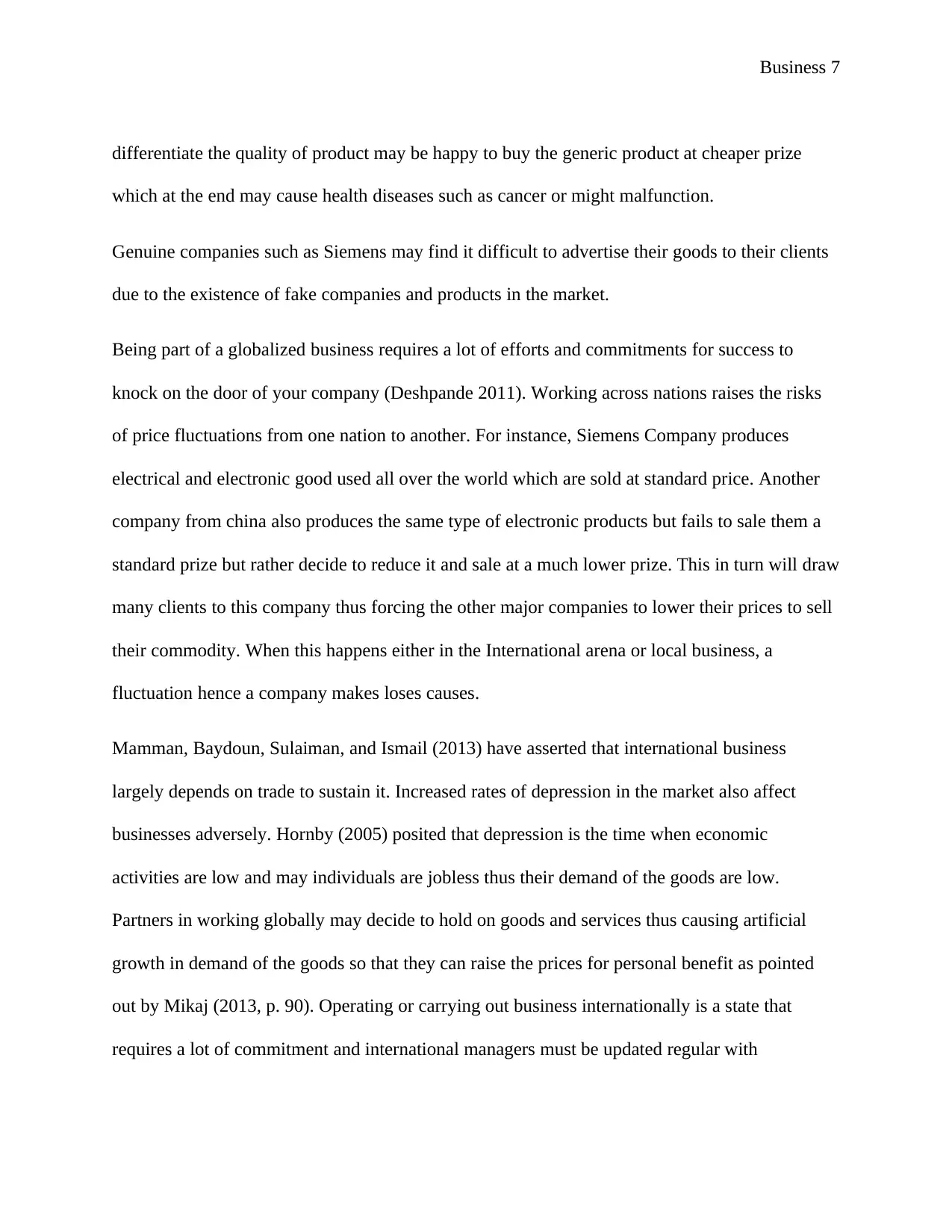
Business 7
differentiate the quality of product may be happy to buy the generic product at cheaper prize
which at the end may cause health diseases such as cancer or might malfunction.
Genuine companies such as Siemens may find it difficult to advertise their goods to their clients
due to the existence of fake companies and products in the market.
Being part of a globalized business requires a lot of efforts and commitments for success to
knock on the door of your company (Deshpande 2011). Working across nations raises the risks
of price fluctuations from one nation to another. For instance, Siemens Company produces
electrical and electronic good used all over the world which are sold at standard price. Another
company from china also produces the same type of electronic products but fails to sale them a
standard prize but rather decide to reduce it and sale at a much lower prize. This in turn will draw
many clients to this company thus forcing the other major companies to lower their prices to sell
their commodity. When this happens either in the International arena or local business, a
fluctuation hence a company makes loses causes.
Mamman, Baydoun, Sulaiman, and Ismail (2013) have asserted that international business
largely depends on trade to sustain it. Increased rates of depression in the market also affect
businesses adversely. Hornby (2005) posited that depression is the time when economic
activities are low and may individuals are jobless thus their demand of the goods are low.
Partners in working globally may decide to hold on goods and services thus causing artificial
growth in demand of the goods so that they can raise the prices for personal benefit as pointed
out by Mikaj (2013, p. 90). Operating or carrying out business internationally is a state that
requires a lot of commitment and international managers must be updated regular with
differentiate the quality of product may be happy to buy the generic product at cheaper prize
which at the end may cause health diseases such as cancer or might malfunction.
Genuine companies such as Siemens may find it difficult to advertise their goods to their clients
due to the existence of fake companies and products in the market.
Being part of a globalized business requires a lot of efforts and commitments for success to
knock on the door of your company (Deshpande 2011). Working across nations raises the risks
of price fluctuations from one nation to another. For instance, Siemens Company produces
electrical and electronic good used all over the world which are sold at standard price. Another
company from china also produces the same type of electronic products but fails to sale them a
standard prize but rather decide to reduce it and sale at a much lower prize. This in turn will draw
many clients to this company thus forcing the other major companies to lower their prices to sell
their commodity. When this happens either in the International arena or local business, a
fluctuation hence a company makes loses causes.
Mamman, Baydoun, Sulaiman, and Ismail (2013) have asserted that international business
largely depends on trade to sustain it. Increased rates of depression in the market also affect
businesses adversely. Hornby (2005) posited that depression is the time when economic
activities are low and may individuals are jobless thus their demand of the goods are low.
Partners in working globally may decide to hold on goods and services thus causing artificial
growth in demand of the goods so that they can raise the prices for personal benefit as pointed
out by Mikaj (2013, p. 90). Operating or carrying out business internationally is a state that
requires a lot of commitment and international managers must be updated regular with
Paraphrase This Document
Need a fresh take? Get an instant paraphrase of this document with our AI Paraphraser
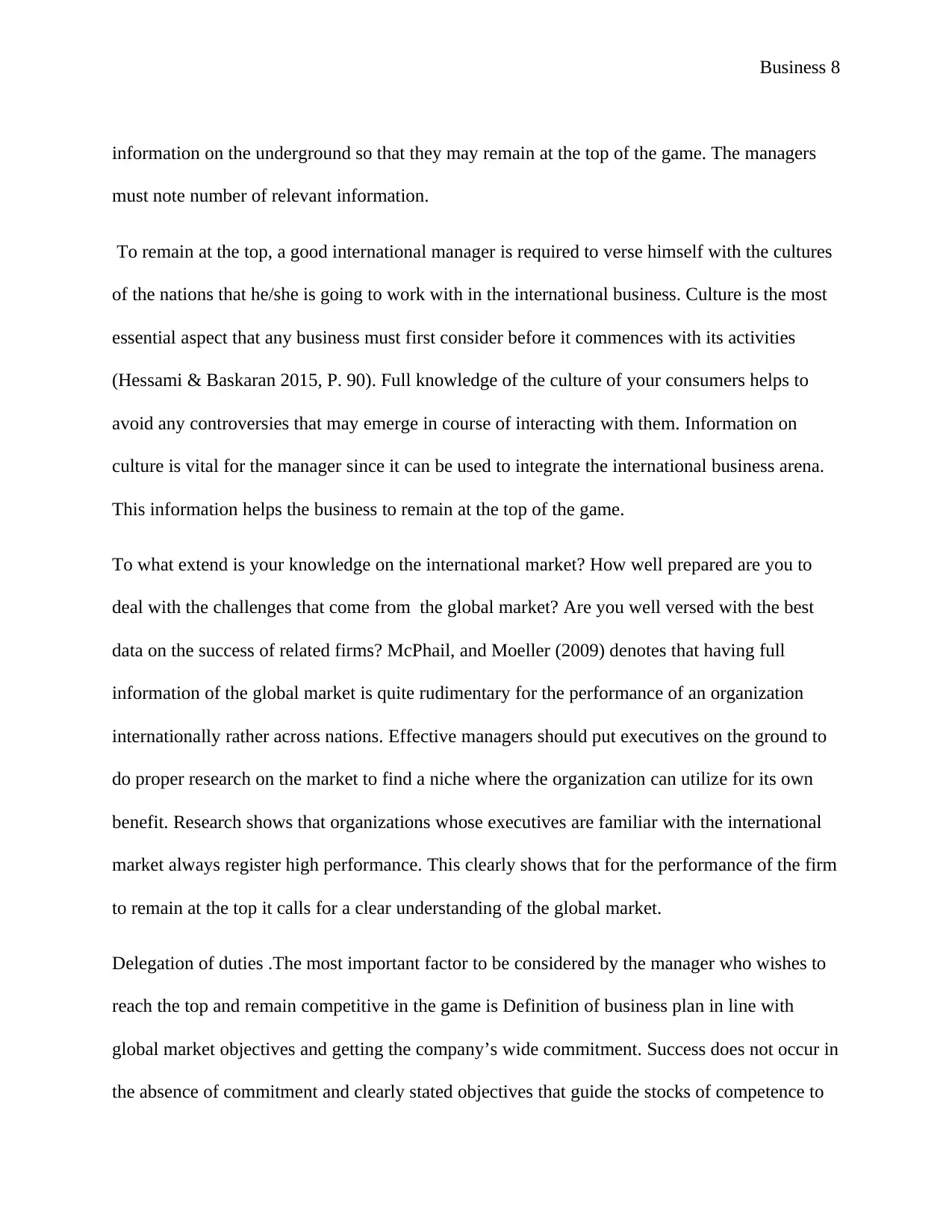
Business 8
information on the underground so that they may remain at the top of the game. The managers
must note number of relevant information.
To remain at the top, a good international manager is required to verse himself with the cultures
of the nations that he/she is going to work with in the international business. Culture is the most
essential aspect that any business must first consider before it commences with its activities
(Hessami & Baskaran 2015, P. 90). Full knowledge of the culture of your consumers helps to
avoid any controversies that may emerge in course of interacting with them. Information on
culture is vital for the manager since it can be used to integrate the international business arena.
This information helps the business to remain at the top of the game.
To what extend is your knowledge on the international market? How well prepared are you to
deal with the challenges that come from the global market? Are you well versed with the best
data on the success of related firms? McPhail, and Moeller (2009) denotes that having full
information of the global market is quite rudimentary for the performance of an organization
internationally rather across nations. Effective managers should put executives on the ground to
do proper research on the market to find a niche where the organization can utilize for its own
benefit. Research shows that organizations whose executives are familiar with the international
market always register high performance. This clearly shows that for the performance of the firm
to remain at the top it calls for a clear understanding of the global market.
Delegation of duties .The most important factor to be considered by the manager who wishes to
reach the top and remain competitive in the game is Definition of business plan in line with
global market objectives and getting the company’s wide commitment. Success does not occur in
the absence of commitment and clearly stated objectives that guide the stocks of competence to
information on the underground so that they may remain at the top of the game. The managers
must note number of relevant information.
To remain at the top, a good international manager is required to verse himself with the cultures
of the nations that he/she is going to work with in the international business. Culture is the most
essential aspect that any business must first consider before it commences with its activities
(Hessami & Baskaran 2015, P. 90). Full knowledge of the culture of your consumers helps to
avoid any controversies that may emerge in course of interacting with them. Information on
culture is vital for the manager since it can be used to integrate the international business arena.
This information helps the business to remain at the top of the game.
To what extend is your knowledge on the international market? How well prepared are you to
deal with the challenges that come from the global market? Are you well versed with the best
data on the success of related firms? McPhail, and Moeller (2009) denotes that having full
information of the global market is quite rudimentary for the performance of an organization
internationally rather across nations. Effective managers should put executives on the ground to
do proper research on the market to find a niche where the organization can utilize for its own
benefit. Research shows that organizations whose executives are familiar with the international
market always register high performance. This clearly shows that for the performance of the firm
to remain at the top it calls for a clear understanding of the global market.
Delegation of duties .The most important factor to be considered by the manager who wishes to
reach the top and remain competitive in the game is Definition of business plan in line with
global market objectives and getting the company’s wide commitment. Success does not occur in
the absence of commitment and clearly stated objectives that guide the stocks of competence to
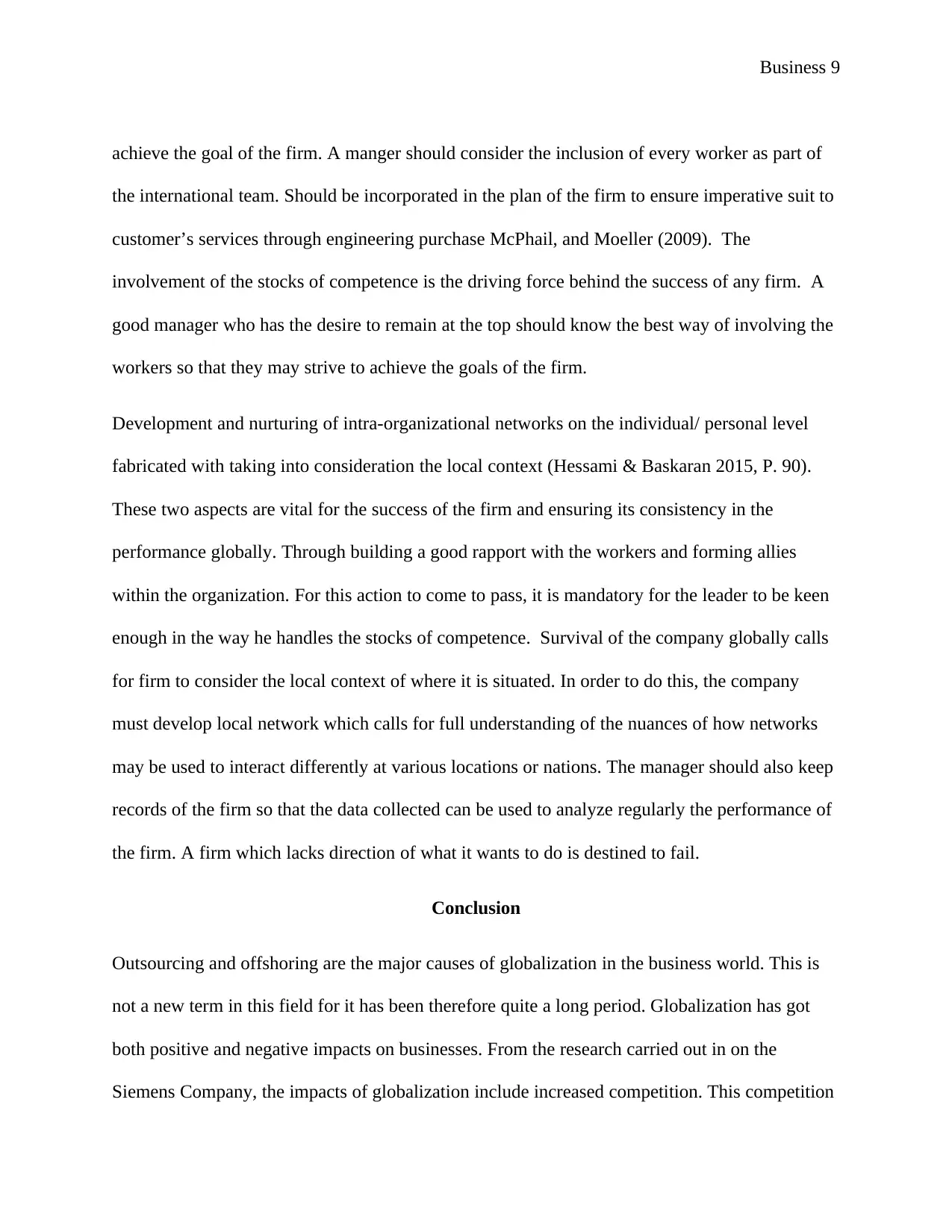
Business 9
achieve the goal of the firm. A manger should consider the inclusion of every worker as part of
the international team. Should be incorporated in the plan of the firm to ensure imperative suit to
customer’s services through engineering purchase McPhail, and Moeller (2009). The
involvement of the stocks of competence is the driving force behind the success of any firm. A
good manager who has the desire to remain at the top should know the best way of involving the
workers so that they may strive to achieve the goals of the firm.
Development and nurturing of intra-organizational networks on the individual/ personal level
fabricated with taking into consideration the local context (Hessami & Baskaran 2015, P. 90).
These two aspects are vital for the success of the firm and ensuring its consistency in the
performance globally. Through building a good rapport with the workers and forming allies
within the organization. For this action to come to pass, it is mandatory for the leader to be keen
enough in the way he handles the stocks of competence. Survival of the company globally calls
for firm to consider the local context of where it is situated. In order to do this, the company
must develop local network which calls for full understanding of the nuances of how networks
may be used to interact differently at various locations or nations. The manager should also keep
records of the firm so that the data collected can be used to analyze regularly the performance of
the firm. A firm which lacks direction of what it wants to do is destined to fail.
Conclusion
Outsourcing and offshoring are the major causes of globalization in the business world. This is
not a new term in this field for it has been therefore quite a long period. Globalization has got
both positive and negative impacts on businesses. From the research carried out in on the
Siemens Company, the impacts of globalization include increased competition. This competition
achieve the goal of the firm. A manger should consider the inclusion of every worker as part of
the international team. Should be incorporated in the plan of the firm to ensure imperative suit to
customer’s services through engineering purchase McPhail, and Moeller (2009). The
involvement of the stocks of competence is the driving force behind the success of any firm. A
good manager who has the desire to remain at the top should know the best way of involving the
workers so that they may strive to achieve the goals of the firm.
Development and nurturing of intra-organizational networks on the individual/ personal level
fabricated with taking into consideration the local context (Hessami & Baskaran 2015, P. 90).
These two aspects are vital for the success of the firm and ensuring its consistency in the
performance globally. Through building a good rapport with the workers and forming allies
within the organization. For this action to come to pass, it is mandatory for the leader to be keen
enough in the way he handles the stocks of competence. Survival of the company globally calls
for firm to consider the local context of where it is situated. In order to do this, the company
must develop local network which calls for full understanding of the nuances of how networks
may be used to interact differently at various locations or nations. The manager should also keep
records of the firm so that the data collected can be used to analyze regularly the performance of
the firm. A firm which lacks direction of what it wants to do is destined to fail.
Conclusion
Outsourcing and offshoring are the major causes of globalization in the business world. This is
not a new term in this field for it has been therefore quite a long period. Globalization has got
both positive and negative impacts on businesses. From the research carried out in on the
Siemens Company, the impacts of globalization include increased competition. This competition
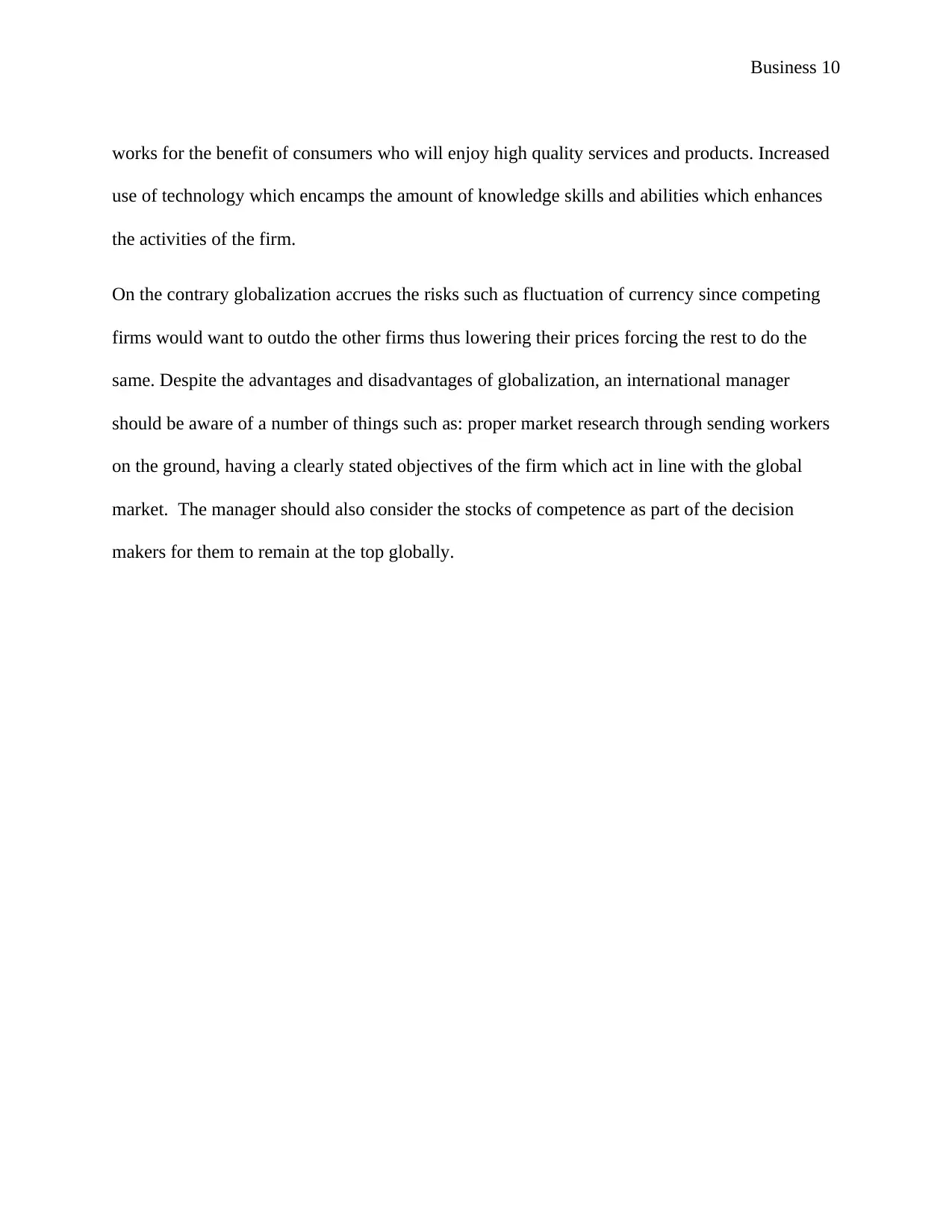
Business 10
works for the benefit of consumers who will enjoy high quality services and products. Increased
use of technology which encamps the amount of knowledge skills and abilities which enhances
the activities of the firm.
On the contrary globalization accrues the risks such as fluctuation of currency since competing
firms would want to outdo the other firms thus lowering their prices forcing the rest to do the
same. Despite the advantages and disadvantages of globalization, an international manager
should be aware of a number of things such as: proper market research through sending workers
on the ground, having a clearly stated objectives of the firm which act in line with the global
market. The manager should also consider the stocks of competence as part of the decision
makers for them to remain at the top globally.
works for the benefit of consumers who will enjoy high quality services and products. Increased
use of technology which encamps the amount of knowledge skills and abilities which enhances
the activities of the firm.
On the contrary globalization accrues the risks such as fluctuation of currency since competing
firms would want to outdo the other firms thus lowering their prices forcing the rest to do the
same. Despite the advantages and disadvantages of globalization, an international manager
should be aware of a number of things such as: proper market research through sending workers
on the ground, having a clearly stated objectives of the firm which act in line with the global
market. The manager should also consider the stocks of competence as part of the decision
makers for them to remain at the top globally.
Secure Best Marks with AI Grader
Need help grading? Try our AI Grader for instant feedback on your assignments.
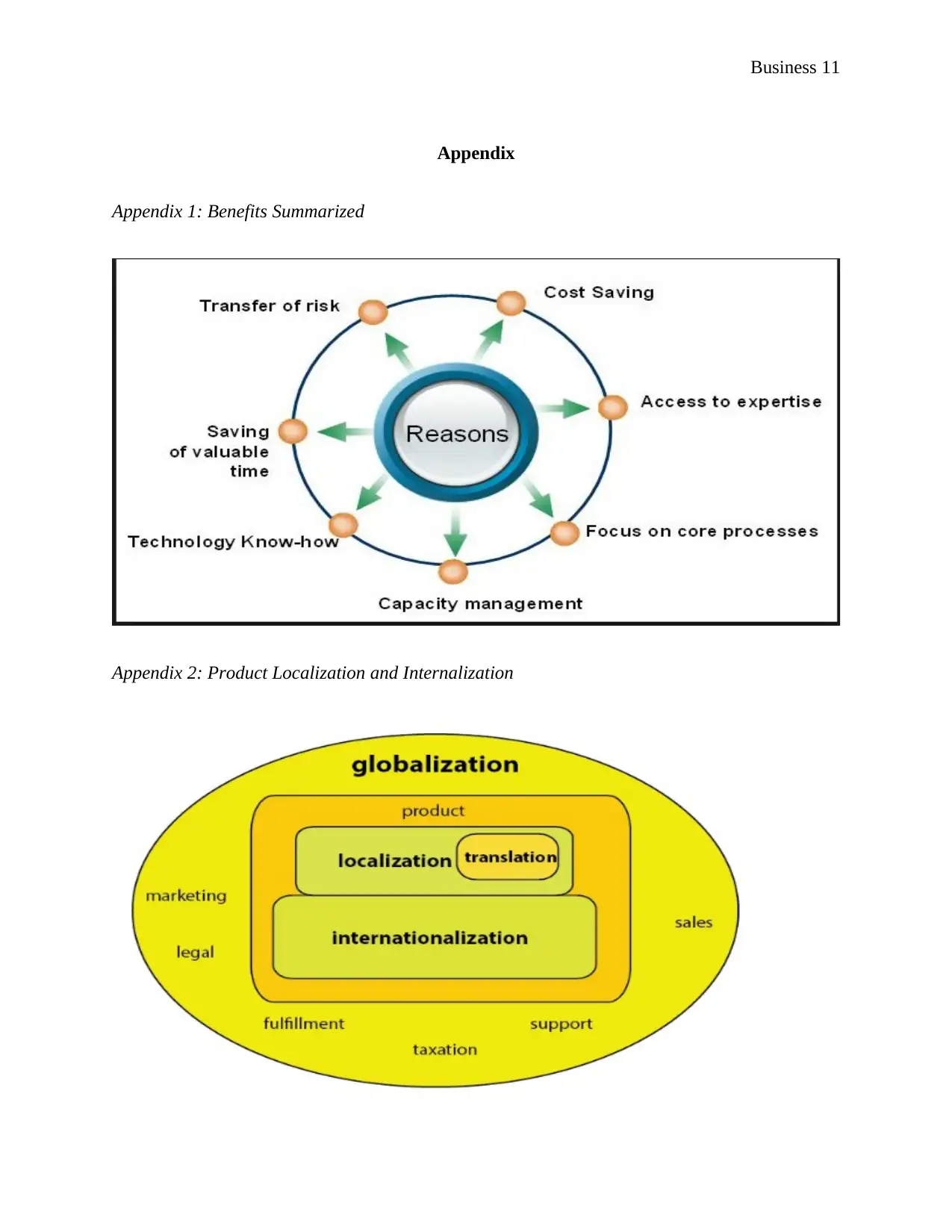
Business 11
Appendix
Appendix 1: Benefits Summarized
Appendix 2: Product Localization and Internalization
Appendix
Appendix 1: Benefits Summarized
Appendix 2: Product Localization and Internalization
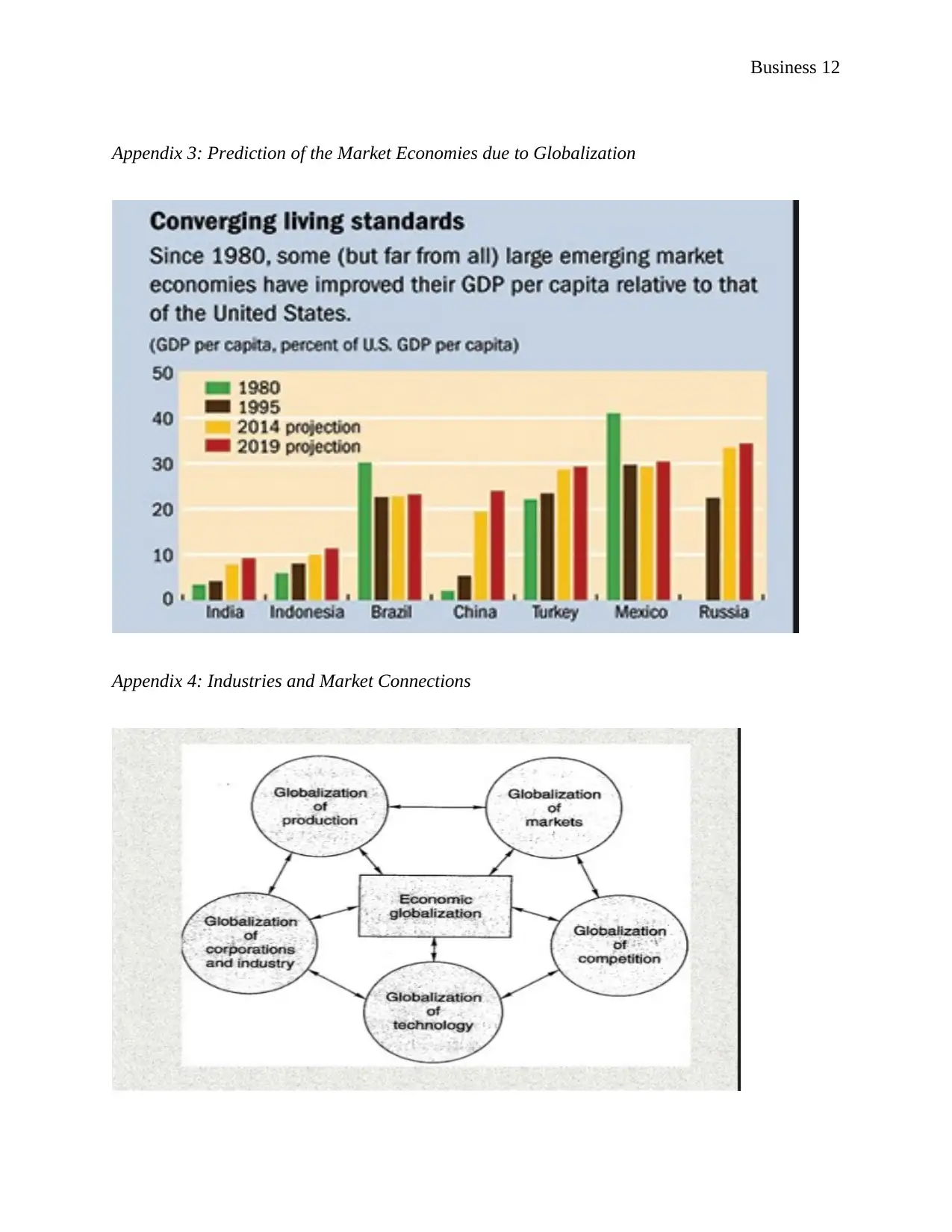
Business 12
Appendix 3: Prediction of the Market Economies due to Globalization
Appendix 4: Industries and Market Connections
Appendix 3: Prediction of the Market Economies due to Globalization
Appendix 4: Industries and Market Connections
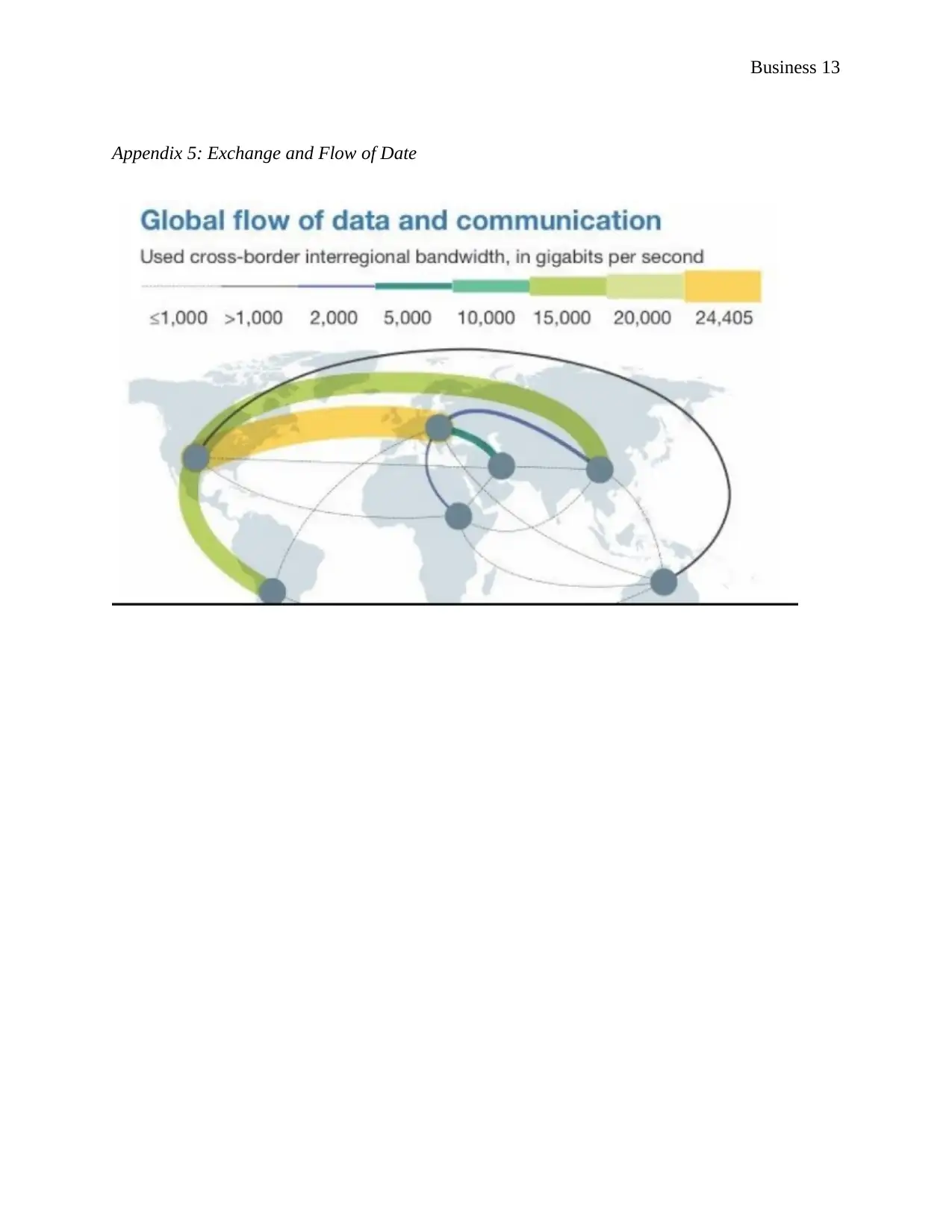
Business 13
Appendix 5: Exchange and Flow of Date
Appendix 5: Exchange and Flow of Date
Paraphrase This Document
Need a fresh take? Get an instant paraphrase of this document with our AI Paraphraser
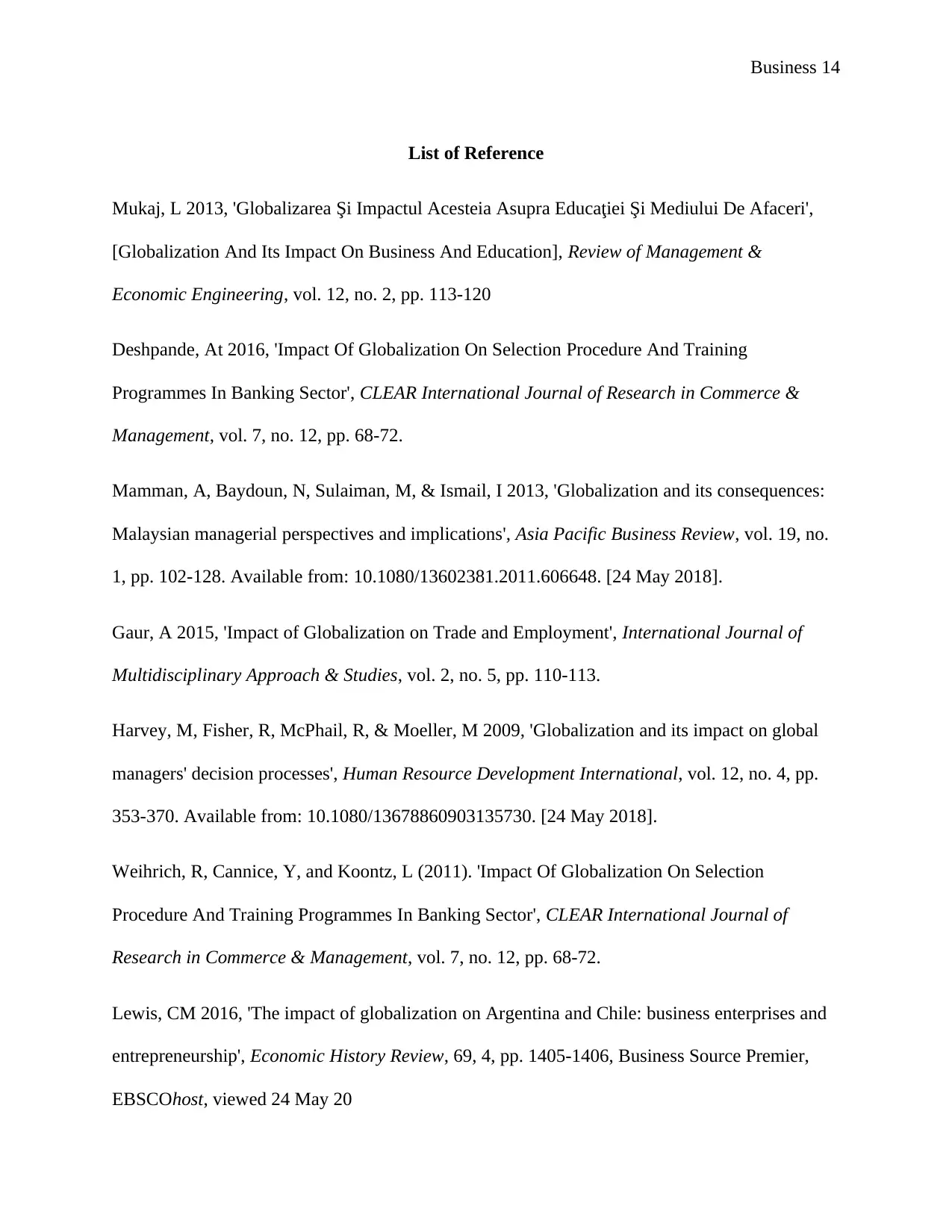
Business 14
List of Reference
Mukaj, L 2013, 'Globalizarea Şi Impactul Acesteia Asupra Educaţiei Şi Mediului De Afaceri',
[Globalization And Its Impact On Business And Education], Review of Management &
Economic Engineering, vol. 12, no. 2, pp. 113-120
Deshpande, At 2016, 'Impact Of Globalization On Selection Procedure And Training
Programmes In Banking Sector', CLEAR International Journal of Research in Commerce &
Management, vol. 7, no. 12, pp. 68-72.
Mamman, A, Baydoun, N, Sulaiman, M, & Ismail, I 2013, 'Globalization and its consequences:
Malaysian managerial perspectives and implications', Asia Pacific Business Review, vol. 19, no.
1, pp. 102-128. Available from: 10.1080/13602381.2011.606648. [24 May 2018].
Gaur, A 2015, 'Impact of Globalization on Trade and Employment', International Journal of
Multidisciplinary Approach & Studies, vol. 2, no. 5, pp. 110-113.
Harvey, M, Fisher, R, McPhail, R, & Moeller, M 2009, 'Globalization and its impact on global
managers' decision processes', Human Resource Development International, vol. 12, no. 4, pp.
353-370. Available from: 10.1080/13678860903135730. [24 May 2018].
Weihrich, R, Cannice, Y, and Koontz, L (2011). 'Impact Of Globalization On Selection
Procedure And Training Programmes In Banking Sector', CLEAR International Journal of
Research in Commerce & Management, vol. 7, no. 12, pp. 68-72.
Lewis, CM 2016, 'The impact of globalization on Argentina and Chile: business enterprises and
entrepreneurship', Economic History Review, 69, 4, pp. 1405-1406, Business Source Premier,
EBSCOhost, viewed 24 May 20
List of Reference
Mukaj, L 2013, 'Globalizarea Şi Impactul Acesteia Asupra Educaţiei Şi Mediului De Afaceri',
[Globalization And Its Impact On Business And Education], Review of Management &
Economic Engineering, vol. 12, no. 2, pp. 113-120
Deshpande, At 2016, 'Impact Of Globalization On Selection Procedure And Training
Programmes In Banking Sector', CLEAR International Journal of Research in Commerce &
Management, vol. 7, no. 12, pp. 68-72.
Mamman, A, Baydoun, N, Sulaiman, M, & Ismail, I 2013, 'Globalization and its consequences:
Malaysian managerial perspectives and implications', Asia Pacific Business Review, vol. 19, no.
1, pp. 102-128. Available from: 10.1080/13602381.2011.606648. [24 May 2018].
Gaur, A 2015, 'Impact of Globalization on Trade and Employment', International Journal of
Multidisciplinary Approach & Studies, vol. 2, no. 5, pp. 110-113.
Harvey, M, Fisher, R, McPhail, R, & Moeller, M 2009, 'Globalization and its impact on global
managers' decision processes', Human Resource Development International, vol. 12, no. 4, pp.
353-370. Available from: 10.1080/13678860903135730. [24 May 2018].
Weihrich, R, Cannice, Y, and Koontz, L (2011). 'Impact Of Globalization On Selection
Procedure And Training Programmes In Banking Sector', CLEAR International Journal of
Research in Commerce & Management, vol. 7, no. 12, pp. 68-72.
Lewis, CM 2016, 'The impact of globalization on Argentina and Chile: business enterprises and
entrepreneurship', Economic History Review, 69, 4, pp. 1405-1406, Business Source Premier,
EBSCOhost, viewed 24 May 20
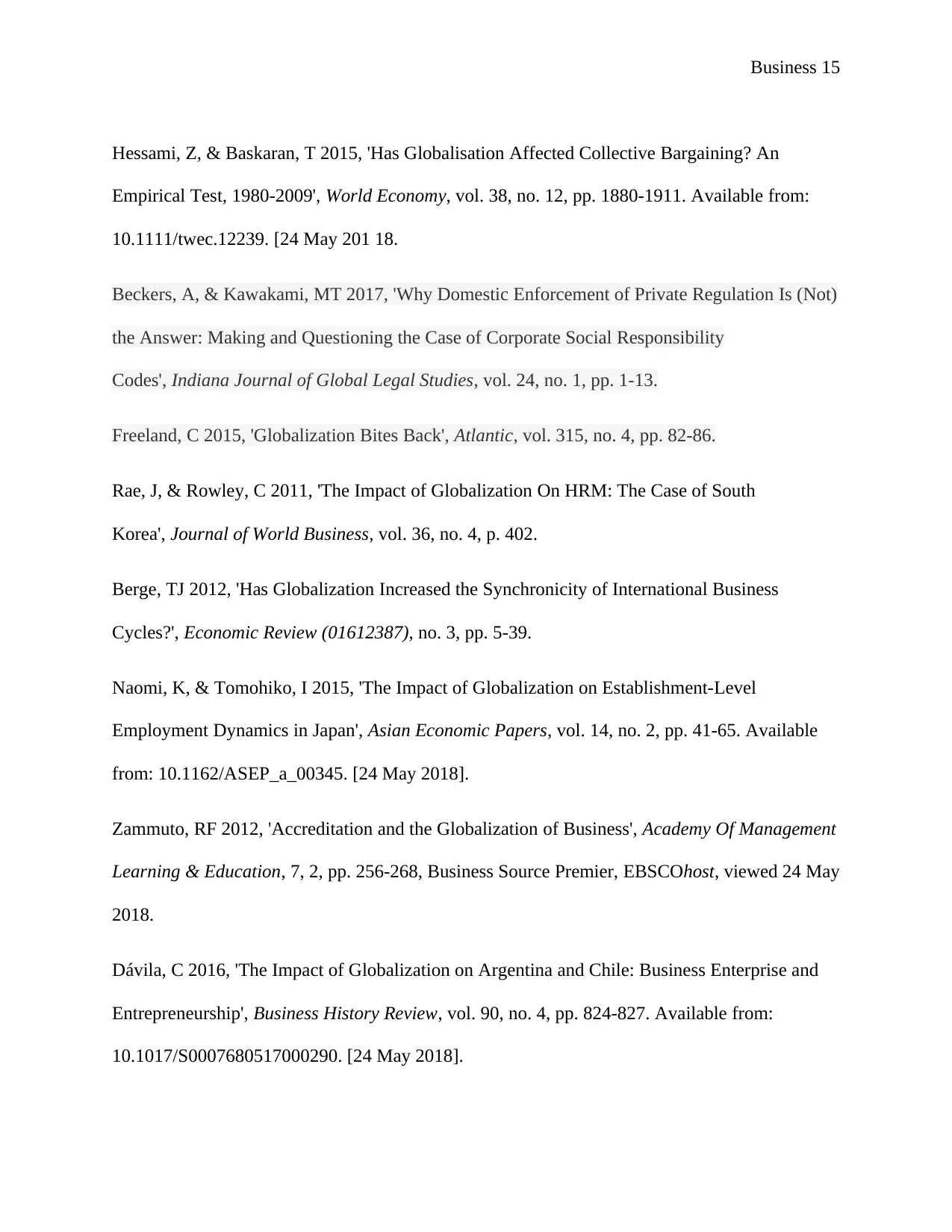
Business 15
Hessami, Z, & Baskaran, T 2015, 'Has Globalisation Affected Collective Bargaining? An
Empirical Test, 1980-2009', World Economy, vol. 38, no. 12, pp. 1880-1911. Available from:
10.1111/twec.12239. [24 May 201 18.
Beckers, A, & Kawakami, MT 2017, 'Why Domestic Enforcement of Private Regulation Is (Not)
the Answer: Making and Questioning the Case of Corporate Social Responsibility
Codes', Indiana Journal of Global Legal Studies, vol. 24, no. 1, pp. 1-13.
Freeland, C 2015, 'Globalization Bites Back', Atlantic, vol. 315, no. 4, pp. 82-86.
Rae, J, & Rowley, C 2011, 'The Impact of Globalization On HRM: The Case of South
Korea', Journal of World Business, vol. 36, no. 4, p. 402.
Berge, TJ 2012, 'Has Globalization Increased the Synchronicity of International Business
Cycles?', Economic Review (01612387), no. 3, pp. 5-39.
Naomi, K, & Tomohiko, I 2015, 'The Impact of Globalization on Establishment-Level
Employment Dynamics in Japan', Asian Economic Papers, vol. 14, no. 2, pp. 41-65. Available
from: 10.1162/ASEP_a_00345. [24 May 2018].
Zammuto, RF 2012, 'Accreditation and the Globalization of Business', Academy Of Management
Learning & Education, 7, 2, pp. 256-268, Business Source Premier, EBSCOhost, viewed 24 May
2018.
Dávila, C 2016, 'The Impact of Globalization on Argentina and Chile: Business Enterprise and
Entrepreneurship', Business History Review, vol. 90, no. 4, pp. 824-827. Available from:
10.1017/S0007680517000290. [24 May 2018].
Hessami, Z, & Baskaran, T 2015, 'Has Globalisation Affected Collective Bargaining? An
Empirical Test, 1980-2009', World Economy, vol. 38, no. 12, pp. 1880-1911. Available from:
10.1111/twec.12239. [24 May 201 18.
Beckers, A, & Kawakami, MT 2017, 'Why Domestic Enforcement of Private Regulation Is (Not)
the Answer: Making and Questioning the Case of Corporate Social Responsibility
Codes', Indiana Journal of Global Legal Studies, vol. 24, no. 1, pp. 1-13.
Freeland, C 2015, 'Globalization Bites Back', Atlantic, vol. 315, no. 4, pp. 82-86.
Rae, J, & Rowley, C 2011, 'The Impact of Globalization On HRM: The Case of South
Korea', Journal of World Business, vol. 36, no. 4, p. 402.
Berge, TJ 2012, 'Has Globalization Increased the Synchronicity of International Business
Cycles?', Economic Review (01612387), no. 3, pp. 5-39.
Naomi, K, & Tomohiko, I 2015, 'The Impact of Globalization on Establishment-Level
Employment Dynamics in Japan', Asian Economic Papers, vol. 14, no. 2, pp. 41-65. Available
from: 10.1162/ASEP_a_00345. [24 May 2018].
Zammuto, RF 2012, 'Accreditation and the Globalization of Business', Academy Of Management
Learning & Education, 7, 2, pp. 256-268, Business Source Premier, EBSCOhost, viewed 24 May
2018.
Dávila, C 2016, 'The Impact of Globalization on Argentina and Chile: Business Enterprise and
Entrepreneurship', Business History Review, vol. 90, no. 4, pp. 824-827. Available from:
10.1017/S0007680517000290. [24 May 2018].

Business 16
1 out of 16
Related Documents
Your All-in-One AI-Powered Toolkit for Academic Success.
+13062052269
info@desklib.com
Available 24*7 on WhatsApp / Email
![[object Object]](/_next/static/media/star-bottom.7253800d.svg)
Unlock your academic potential
© 2024 | Zucol Services PVT LTD | All rights reserved.





